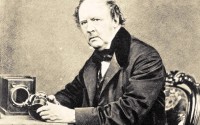Merely a speculation of the mind: William Henry Fox Talbot and mathematics
- Date
- 20 Sep 2016
- Start time
- 7:30 PM
- Venue
- Tempest Anderson Hall
- Speaker
- Prof June Barrow Green

Merely a speculation of the mind: William Henry Fox Talbot and mathematics
Professor June Barrow Green, Department of Mathematics and Statistics, The Open University
William Henry Fox Talbot (18001877) is well known today as a pioneer of photography. What is less well known is that he began his scientific career in mathematics and sustained an active interest in mathematics throughout his life. His first and last scientific publications were in mathematics and in 1838 he was awarded a Gold Medal from the Royal Society for mathematical work. But for Talbot mathematics was never a career and his mathematical achievements, lauded at the time, were soon largely forgotten. But to consider Talbot’s mathematics solely in terms of his contributions to the mathematical canon would be to do it an injustice. Mathematics for Talbot was not just about proving theorems: it was a subject he enjoyed in its own right and it was a subject which provided him with a model for scientific investigation. In my talk I shall explore the different phases of Talbots mathematical life, starting from childhood beginnings, going through Cambridge and the Royal Society, and ending in Edinburgh, having taken in Montpellier along the way.
Member’s report
William Henry Fox Talbot (18001877) is known as a pioneer of photography, but throughout his life he took an active interest in mathematics. In outlining this, Prof Green gave us not only a glimpse of the work done by her subject, but also an insight into some of the failings of mathematical education and the study of mathematics in England during this period.
After qualifying at Cambridge, Fox Talbot published many mathematical papers. His first were in the Annales de Gergonne. Later he published in the journals of the Royal Society of London, which awarded him a Gold Medal, and his latter papers were in the Transactions of the Royal Society of Edinburgh. He corresponded with many notable individuals, including Herschel. Though not a major mathematician, he pursued the subject for his own enjoyment, and his interests were wide-ranging, including Fermat’s last theorem, elliptical integrals, and cubic and higher degree equations.
Margaret Leonard